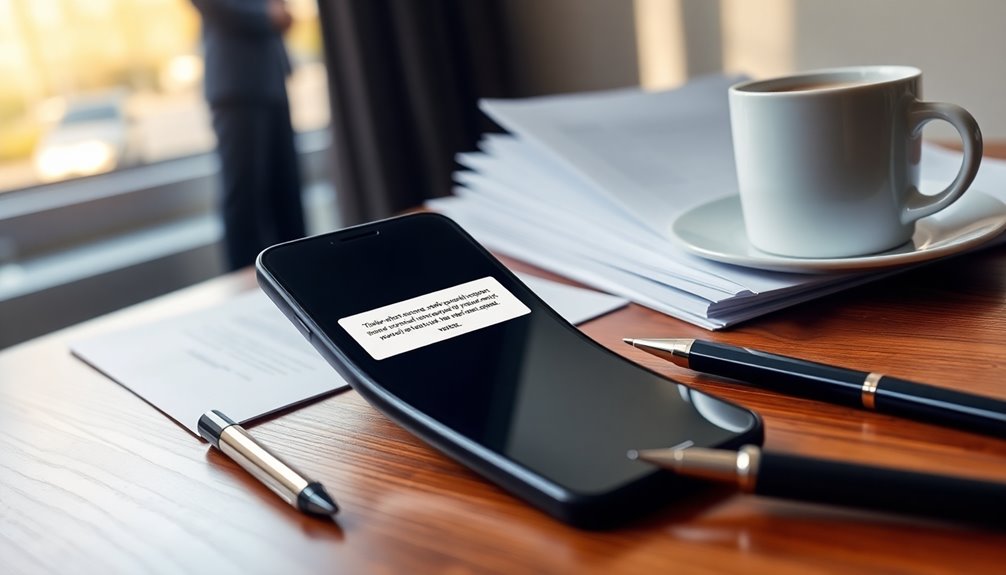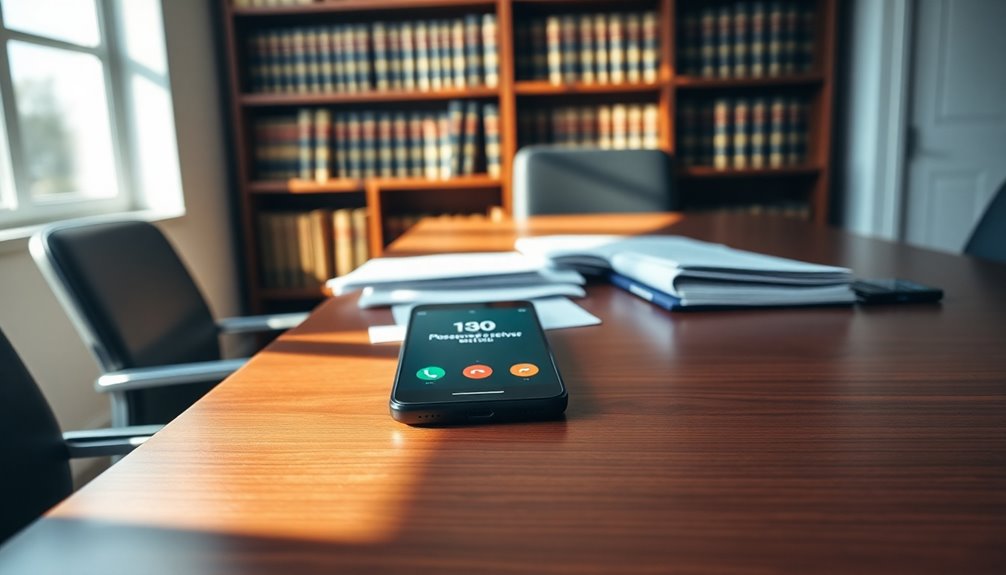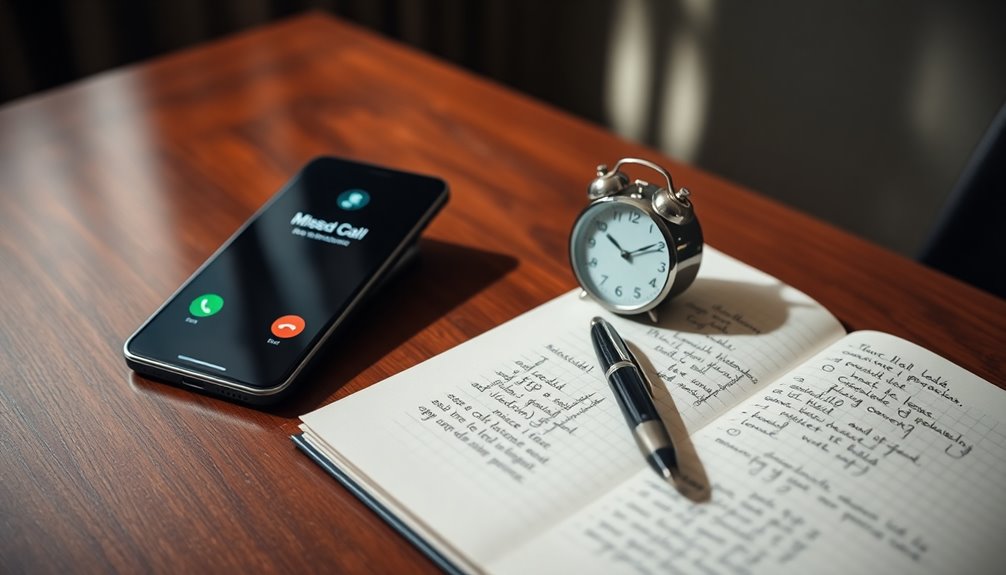Process servers usually don't leave voicemails because they need to deliver legal documents in person for the service to be valid. If a process server were to leave a voicemail, it might indicate a failure to serve properly. Most legitimate servers won't request personal information or payment via voicemail. Instead, they focus on direct communication to guarantee you're aware of any legal actions against you. If you're unsure about a voicemail you've received or the legitimacy of the caller, there are steps you can take to verify the situation and protect yourself.
Understanding Process Servers
Understanding process servers is vital for traversing the legal landscape. These professionals are tasked with delivering legal documents like summons and subpoenas directly to individuals, ensuring they're informed of legal actions against them.
When it comes to process serving, the law requires that these documents are served in person. This means you won't receive a voicemail about a legal matter; the delivery must be face-to-face to fulfill legal requirements. Additionally, security best practices in handling legal documents help prevent unauthorized access to sensitive information. It's crucial to ensure that the process server adheres to strong passwords and other security measures to protect sensitive data during the serving process.
Legitimate process servers are registered and licensed, which adds a layer of credibility to their role. They carry official identification, so when they arrive at your door, you can verify their authority.
It's important to recognize that their role supports the integrity of the legal system. By ensuring all parties are aware of legal proceedings, they help maintain fairness and transparency.
In cases where personal service fails, some jurisdictions permit alternative methods like mailing documents. However, leaving voicemails is never an option for serving legal documents. Proactive security practices are also essential for protecting sensitive information related to legal matters.
Understanding these aspects helps you navigate any legal situation more effectively, keeping you informed and prepared.
The Role of Voicemails
Voicemails play a limited role in the world of process serving, primarily because they don't satisfy legal requirements for delivering documents.
Process servers must serve legal documents in person to guarantee the service is valid. Leaving a voicemail simply doesn't fulfill this requirement, as service must occur through direct contact or appropriate legal channels. Securing WordPress sites is crucial for protecting sensitive information, just as legal processes must be handled carefully. Additionally, the importance of regular backups cannot be overstated, as they ensure vital information is preserved against loss or damage.
In Washington and many other jurisdictions, law emphasizes the necessity of personal delivery, especially for subpoenas.
So, if you receive a voicemail claiming to be from a process server, it's important to approach it with caution. Such messages may not hold any legal weight, and interpreting them as official notifications could lead to confusion.
Moreover, be wary of potential process server scams. Fraudsters might leave misleading voicemails to create panic or solicit personal information. Implementing strong security measures can help protect your personal information from such scams.
If you do receive a voicemail regarding a legal process, document the details carefully, including the content of the message and any contact information provided. This documentation can be vital if the legitimacy of the service is questioned later on.
Always remember, a voicemail isn't a substitute for direct legal service.
When Voicemails Are Left

Leaving a voicemail can create confusion, especially when it comes from someone claiming to be a process server. Typically, process servers don't leave voicemails because personal delivery is the standard for serving legal documents. If you receive a voicemail from someone saying they're a process server, it might indicate a failure to serve you properly.
Remember, in Washington, legal proceedings require personal service or delivery to your usual residence, making voicemails insufficient for legal notification. Regular assessments of backup schedules can enhance the security of your legal documents. Additionally, having a well-planned backup strategy for your important files can mitigate risks of data loss.
When you listen to such a message, be cautious. Genuine process servers rarely ask for personal information or payment in their voicemails, which can help you distinguish between a legitimate call and a potential process server scam. Additionally, understanding the importance and frequency of backups can aid in managing your legal documents safely.
Verify the caller's legitimacy before taking any action. If the voicemail raises red flags, such as unusual requests or vague information, take it seriously. It's crucial to guarantee your legal rights are protected.
Always trust your instincts and consider reaching out to legal professionals if you're unsure about the situation. Being informed can help you navigate any potential issues related to these unexpected calls.
Identifying Legitimate Process Servers
When you receive a voicemail claiming to be from a process server, it's essential to verify their credentials. Legitimate servers are required to provide official identification and specific details about the documents they're delivering. Spotting scam characteristics early can save you from potential fraud. Additionally, ensure that any claims made by the server are backed by secure identification practices, as this is crucial for avoiding scams. To further protect yourself, consider implementing strong security measures on your digital devices to safeguard against potential threats. Utilizing a secure file upload solution can also help protect sensitive information during any necessary document exchanges.
Verifying Process Server Credentials
Understanding a process server's credentials is vital for guaranteeing you're dealing with a legitimate professional. When facing potential legal action, you want to verify that the person serving you is certified and trustworthy.
Here are key steps to help you verify process server credentials:
- Request official identification and court-issued documents during any interaction.
- Check state databases to confirm their registration and licensing status.
- Be cautious of unexpected phone calls; genuine process servers rarely reach out before serving documents.
- Document every detail of any calls you receive, including date, time, and content.
If you ever feel uncertain, don't hesitate to contact the court or law firm directly. They can help validate the claims made by the individual claiming to be a process server.
By taking these steps, you not only protect yourself but also guarantee that you're engaging with a legitimate professional. Verifying process server credentials is essential in maintaining your peace of mind and safeguarding against potential scams.
Trust your instincts, and always prioritize your safety in these interactions.
Identifying Scam Characteristics
Scammers often exploit confusion around process serving, making it important to recognize the signs of a legitimate process server. When you receive a voicemail claiming to be from a process server, don't rush into action. Verify the caller's identity and affiliation first.
Legitimate process servers typically don't leave voicemails; they rely on personal delivery to serve legal documents. If a process server does call, they'll provide specific information about the case, including the involved parties and case numbers.
In contrast, a Fake Process Server often lacks these essential details. Watch out for red flags, like unsolicited voicemails demanding immediate payment or personal information—legitimate process servers won't request this from you.
Authentic process servers must present official identification and court-issued documents when they arrive. They'll never use intimidation tactics or aggressive language in their communications.
Trust your instincts; if something feels off, it probably is. Protect yourself by staying informed and cautious. When in doubt, consult with legal professionals for guidance on identifying a genuine process server.
Common Voicemail Content

When it comes to voicemails from process servers, the content is usually quite limited. They typically won't demand payment or threaten you, as that's a sign of a scam. Instead, a legitimate voicemail may briefly mention the nature of the documents and provide a callback number, but remember that personal service is the priority. Additionally, it's important to note that legitimate service of process often requires in-person delivery to ensure legal compliance. Proper documentation is crucial in these situations to establish that the service has been completed according to legal standards. Having a well-configured post-installation script can also streamline the process of managing legal documents efficiently.
Legal Document Delivery Protocol
Most process servers won't leave voicemails when delivering legal documents, as personal service is necessary for the delivery to be considered valid.
Leaving a voicemail doesn't fulfill the legal requirements for notifying individuals. In fact, under Washington law, documents like subpoenas must be served either personally or at the recipient's usual residence.
If you happen to receive a voicemail claiming to be from a process server, it's essential to verify the caller's identity.
Here's what you might expect from a legitimate process server:
- A brief introduction, stating their name and agency.
- A mention of the legal documents being served.
- An instruction to expect personal delivery soon.
- A reminder to consult legal counsel for further information.
Voicemail Content Limitations
Understanding the limitations of voicemail content from process servers can help you discern legitimate communication from potential scams. Typically, a process server won't leave voicemails that constitute valid legal service, as personal delivery is required. So, if you receive a voicemail claiming to serve documents, it's important to approach it with caution.
Legitimate servers usually provide basic identification information in their voicemails but avoid disclosing sensitive case details or making personal threats. Their messages may reference a pending legal matter, but they won't include specifics that demand immediate action.
You should also note that legitimate servers don't request payment directly from individuals being served, so if you hear demands for money, it's probably a scam.
If a voicemail includes aggressive language or intimidation tactics, that's another red flag. Real process servers adhere to professional conduct standards and won't resort to such tactics.
Importance of Personal Service
In the domain of legal matters, personal service is vital for guaranteeing that all parties are fully informed of the actions being taken against them. When it comes to delivering legal documents, nothing substitutes the legitimacy of in-person delivery. Voicemails simply don't cut it.
Here's why personal service is essential:
- Clear communication: You'll receive specific details about the legal action.
- Verification of identity: A process server confirms who you're and that you received the documents.
- Legal compliance: Following protocols guarantees that the service meets local laws.
- Reduced risk of scams: Personal delivery minimizes the chance of falling victim to fraudulent claims.
According to Washington law, personal delivery of subpoenas is necessary; a voicemail can't fulfill this requirement.
Legitimate process service emphasizes that while communication methods can vary, the standard remains personal delivery. If you receive a voicemail regarding legal documents, take the time to verify the legitimacy of the claim.
Relying solely on a voicemail for legal service acknowledgment can lead to complications down the road. Always prioritize personal service to guarantee your legal rights are fully protected.
Warning Signs of Scams
When you receive a voicemail claiming to be from a process server, it's crucial to stay alert for potential warning signs of a scam.
Legitimate process servers typically don't leave voicemails, as their job requires direct, personal delivery of documents. If the message demands immediate payment or personal information, consider it a major red flag.
Genuine process servers can provide specific case details when asked, while scammers often avoid these specifics or claim that documents are sealed.
Another warning sign is if the voicemail threatens legal consequences without prior notification. Authentic process servers don't use intimidation tactics; they follow proper protocols.
If you hear a voicemail pushing you to act quickly, take a step back and assess the situation.
To verify any claims made in the voicemail, contact local law enforcement or reach out to local courts or law firms directly. This can help guarantee that any legal actions referenced actually exist and can protect you from falling victim to a scam.
Stay informed and cautious, and you can avoid being tricked by these deceitful tactics.
Responding to Suspicious Voicemails

Receiving a suspicious voicemail that claims to be from a process server can be unsettling, and knowing how to respond is vital.
Here's what you should do if you find yourself in this situation:
- Stay calm: Don't panic; scams thrive on fear and urgency.
- Document everything: Write down the date, time, and details of the voicemail, as this information could be important later.
- Look for red flags: If the voicemail demands immediate payment or personal information, it's likely a scam.
- Evaluate the tone: Voicemails that sound aggressive or lack specific case information are often not legitimate.
Verifying Caller Identity
Verification of a caller's identity is vital, especially if you suspect a voicemail may be fraudulent. When you receive a message claiming to be from a process server, it's imperative to take immediate action.
Remember, legitimate service requires personal delivery, so a voicemail alone raises red flags.
To verify the identity of the caller, ask them for identification and proof of their affiliation. A genuine process server should readily provide this information. If they can't, that's a significant warning sign.
It's also wise to contact the court or law firm directly to confirm any claims made by the caller. This step can help you ascertain you're not falling victim to a scam.
Additionally, document the date, time, and content of the call. This record can assist you in verifying the legitimacy of the process server and can prove invaluable if you need to report a suspicious call.
Always trust your instincts; if something feels off, take the necessary precautions. By following these steps, you can protect yourself and make sure that any communication you receive is from a legitimate source.
Legal Obligations of Process Servers

Understanding the legal obligations of process servers is vital for anyone involved in a legal matter. These professionals have specific duties to guarantee that legal documents are served correctly, and failing to meet these obligations can have serious consequences.
Key legal obligations of a process server include:
- Delivering documents in person, guaranteeing personal service.
- Providing proper identification and court-issued documents at the time of service.
- Making sure the recipient is aware of the legal action being taken against them.
- Following strict procedures for alternative service methods, like mailing, if personal service fails.
In many jurisdictions, including Washington, the law requires that subpoenas be served personally or at the individual's usual residence.
If a process server doesn't adhere to these legal obligations, the recipient may not be compelled to appear in court, undermining the entire legal process.
Consequently, it's essential for process servers to follow the established protocols diligently. By understanding these responsibilities, you can appreciate the role they play in guaranteeing that justice is served properly and effectively.
Reporting Fraudulent Calls
When you get a voicemail claiming to be from a process server, it's vital to stay alert and cautious. First, document the date, time, and content of the message. This information will be important if you need to take further action.
Legitimate process servers usually don't leave voicemails demanding payment or making vague legal threats, so treat such messages with skepticism.
If you receive a suspicious call, don't hesitate to report it to local law enforcement. They can help investigate potential fraud in your area. Additionally, filing a complaint with the Federal Trade Commission (FTC) can aid broader consumer protection efforts.
Be particularly wary if the caller fails to provide a physical address or any contact information for verification. This is a significant red flag that indicates potential fraud.
Educating those around you about recognizing and reporting fraudulent calls can also help prevent victimization in your community. By staying informed and proactive, you can protect yourself and others from scams that may disguise themselves as legitimate communications from process servers.
Protecting Yourself From Scams

Scams can often disguise themselves in familiar forms, like phone calls claiming to be from process servers. To protect yourself, it's crucial to recognize these scams and avoid falling victim. Here's how you can stay safe:
- Be wary of aggressive demands for immediate payment or personal information.
- Trust your instincts if a voicemail seems threatening or uses scare tactics.
- Always verify identity by asking for identification and proof of affiliation before sharing any details.
- Document suspicious voicemails, including the date, time, and content, to keep a record.
Legitimate process servers won't leave voicemails, and they don't require payment from you.
If you receive a suspicious call, don't hesitate to report it to local law enforcement and the Federal Trade Commission (FTC).
By staying informed and cautious, you can shield yourself from potential fraud.
Importance of Documentation
When you receive a voicemail, it's essential to document the details like date, time, and content.
This record not only helps verify the legitimacy of the caller but also serves as an important reference in any legal disputes.
Keeping a clear communication log can protect you from scams and guarantee you're prepared if questions arise later.
Legal Document Verification
Legal document verification plays an essential role in guaranteeing that you're informed about your rights and obligations in any legal matter.
When you receive legal documents, it's vital to verify their authenticity. This helps you avoid unnecessary complications and guarantees you're aware of the legal actions being taken against you.
To effectively verify legal documents, keep an eye out for:
- Clear case numbers that identify your specific legal situation
- Names of all involved parties, so you know who's on the other side
- Accurate court information that directs you to the right legal authority
- Dates that help you track when actions were initiated and deadlines
Call Log Maintenance
Keeping a call log is essential for anyone managing legal matters, as it helps you maintain accurate records of all communications. Call log maintenance allows you to track important information, such as the date, time, and content of every call. This documentation is critical for future reference and can be invaluable if you need to substantiate claims or disputes.
When documenting details of suspicious calls, make sure to note the caller's name, the company they represent, and any claims they make. This practice not only helps in identifying potential scams but also provides evidence should you need it down the line.
A well-maintained call log assists in recognizing patterns of communication, which can be significant in identifying repeat offenders or ongoing scams. Additionally, accurate documentation enhances your understanding of the situation, enabling you to respond appropriately.
If you need to reach out to attorneys or law enforcement, having a detailed call log can support your case effectively. By prioritizing call log maintenance, you equip yourself with the necessary tools to navigate legal matters while protecting your interests.
Communication Record Importance
Recognizing the significance of thorough communication records can be a game changer in managing legal matters. When you communicate with a process server, documenting every detail is essential. This practice not only guarantees you have a clear record but also helps safeguard your rights.
Here are a few key points to reflect on:
- Date and Time: Log when you receive voicemails or calls.
- Content of Messages: Note what the process server says, including any case numbers or names.
- Payment Demands: Identify any unusual requests for money that could indicate a scam.
- Evidence Verification: Use your records to back up claims if disputes arise.
Maintaining thorough documentation of all communications, especially with process servers, enhances your understanding of your legal obligations.
By keeping track of these interactions, you can effectively verify the legitimacy of the service and confirm you're prepared for any ongoing or potential legal proceedings.
Ultimately, this diligence not only protects you but also empowers you in managing the complexities of the legal system.
Resources for Legal Assistance

Finding reliable resources for legal assistance can make a significant difference in maneuvering the complexities of the law. You can start by reaching out to local bar associations, which often provide referral services to connect you with qualified attorneys in various practice areas. This can be especially helpful if you need to consult with a licensed attorney who specializes in your specific issue.
If you're looking for immediate advice, consider online legal platforms like JustAnswer. They allow you to ask legal questions and get responses from licensed professionals, making it easy to access help from anywhere in the world.
For those who may need financial assistance, many legal aid organizations offer free or low-cost services based on income criteria, ensuring that everyone has access to legal representation and advice.
Don't forget to explore state-specific resources as well. Court websites often feature guides and FAQs that can help you understand your legal rights and navigate the legal process more effectively.
Ultimately, consulting with an attorney is essential for personalized legal advice tailored to your circumstances.
Conclusion
In summary, while it's rare for process servers to leave voicemails, knowing how to identify legitimate ones can keep you informed. Did you know that around 30% of people report receiving scam calls related to legal matters? It's essential to stay vigilant and protect yourself from fraud. Always document any suspicious calls and seek legal assistance if needed. Being proactive not only safeguards you but also helps you navigate the legal process with confidence.


